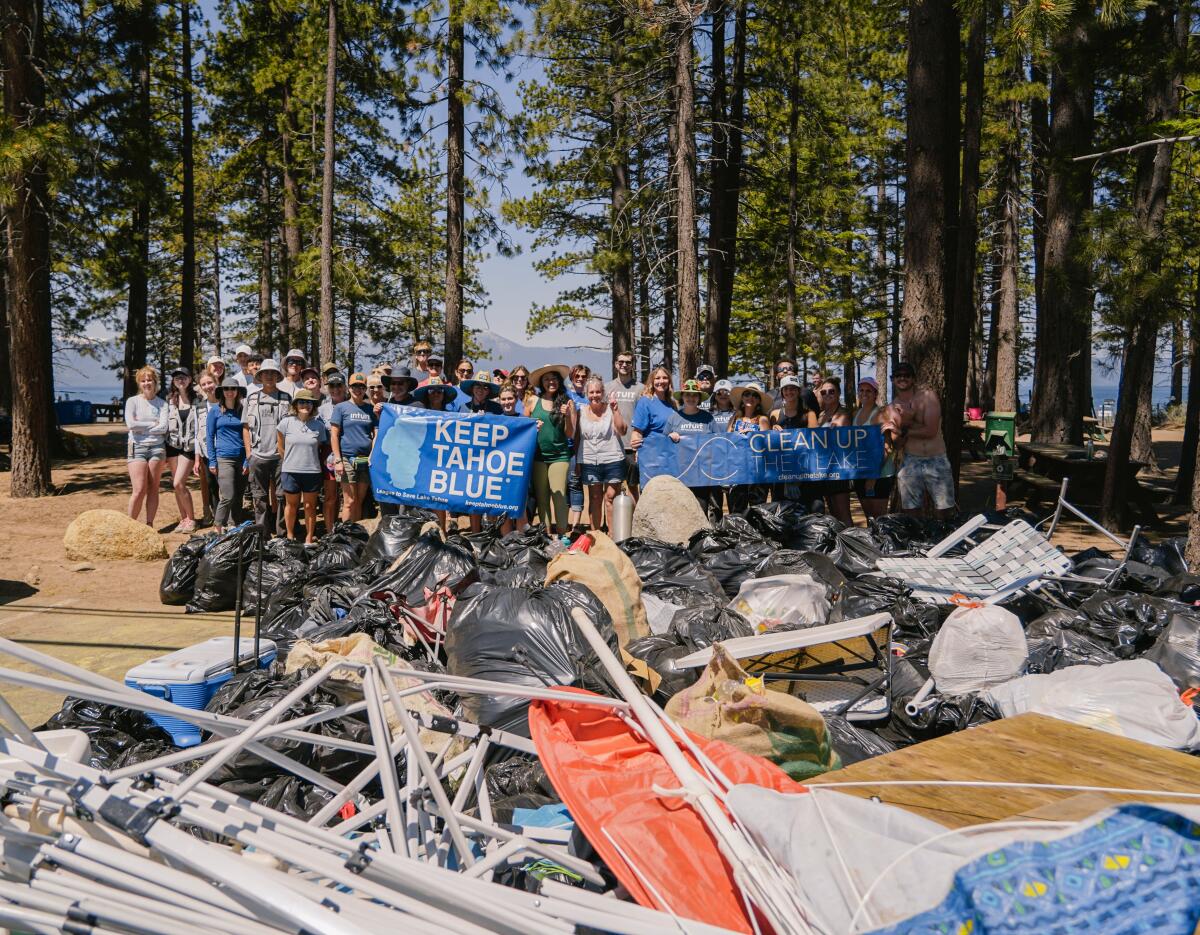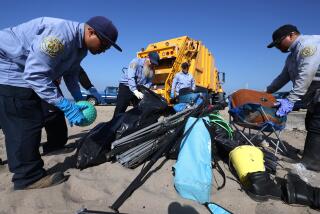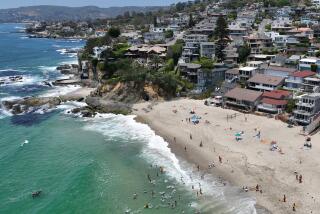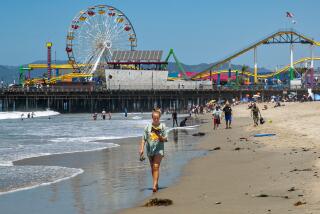Visitors to Lake Tahoe leave a record four tons of trash during Fourth of July celebrations

- Share via
Partygoers who crowded Lake Tahoe beaches over the Fourth of July left more than four tons of trash on the shore and in the water, according to cleanup volunteers.
A record total of 8,559 pounds of trash was collected from six beaches, according to the League to Save Lake Tahoe, the nonprofit that led the effort. The hardest hit was Zephyr Shoals, a beach on Tahoe’s east shore, where hundreds of volunteers cleaned 6,279 pounds of litter, including plastic cups, beach toys and cigarette butts. The beach there has fewer regulations than many in the area.
Images shared by the organization reveal toppled tents, chairs and coolers scattered across the beach, with geese poking their beaks through Cheetos bags and beer cans.
Daniel Cressy, a public services staff officer for the Lake Tahoe Basin Management Unit, estimated that more than 4,000 people visited Zephyr Shoals at the peak of the celebrations.
The lake this year was near its high water level, and beaches dramatically shrunken, as a result of melting from record-breaking snowpack, forcing visitors to spill onto the bluffs instead of sticking to the sand.
“I heard some folks show up and say, ‘Where’s the beach?’ They were expecting more beach, but that didn’t discourage them from staying,” Cressy said. “It looked like your most crowded music festival.”
This year marked the nonprofit’s 10th annual “Keep Tahoe Red, White & Blue” July 5 cleanup event.
The mess was cleaned up with support from the U.S. Forest Service and 400 volunteers from local businesses and government agencies, including the nonprofit Clean up the Lake, which brought in scuba divers, kayakers and snorkelers.
“BEBOT,” an electric sand-sifting robot combed the beach, too, salvaging bits of plastic.
Colin West, executive director of Clean up the Lake, said his team fished sunglasses, shoes and vape pens from the water. He said he found small bags of cocaine and canisters of “whippets,” an inhalant drug.
“Images that I’ve seen [of the partying] have just been ridiculous. Literally someone … jumping off, like, a log and body-slamming a beer-pong table into the lake and breaking it,” he said. “I remember my fiance and I unloading that beer-pong table into the dumpster in the back of my truck.”
Among the people dedicated to keeping Tahoe clean, the holiday mess elevated an ongoing conversation about beach management. According to the League to Save Lake Tahoe, several beach sites — including those with permanent restrooms, trash cans and management staff — were relatively free of litter.
Zephyr Shoals, which is within the jurisdiction of the U.S. Forest Service, is not permitted for commercial operations and does not have designated parking or fees. Chris Joseph, communications director for the League to Save Lake Tahoe, said that’s a problem.
“What we have seen in 10 years of managing this July 5 cleanup event is that sites that have no regulation of access … are the places where the impacts from litter tend to be the heaviest,” he said. “There’s always going to be a group of people who don’t want to pay to park, and they do want to party, and they’re being squeezed into the few remaining places on the lake where it’s relatively easy to get there.”
Zephyr Shoals will be permitted as part of Zephyr Cove Resort in the fall, according to Cressy. That means the public — who will retain access to the beach — can expect the addition of designated parking and sanitation, he said.
Cressy wants Lake Tahoe visitors to be responsible for keeping the lake clean. He said he was pleased to see people happily taking the trash bags he handed out over the holiday weekend, some asking for more.
“Enjoyment of public land is not just a consumer activity, but it’s a participatory activity where everybody has a role to play in it being successful,” he said. “That’s sort of the bigger picture that we’re working toward.”
More to Read
Sign up for Essential California
The most important California stories and recommendations in your inbox every morning.
You may occasionally receive promotional content from the Los Angeles Times.











